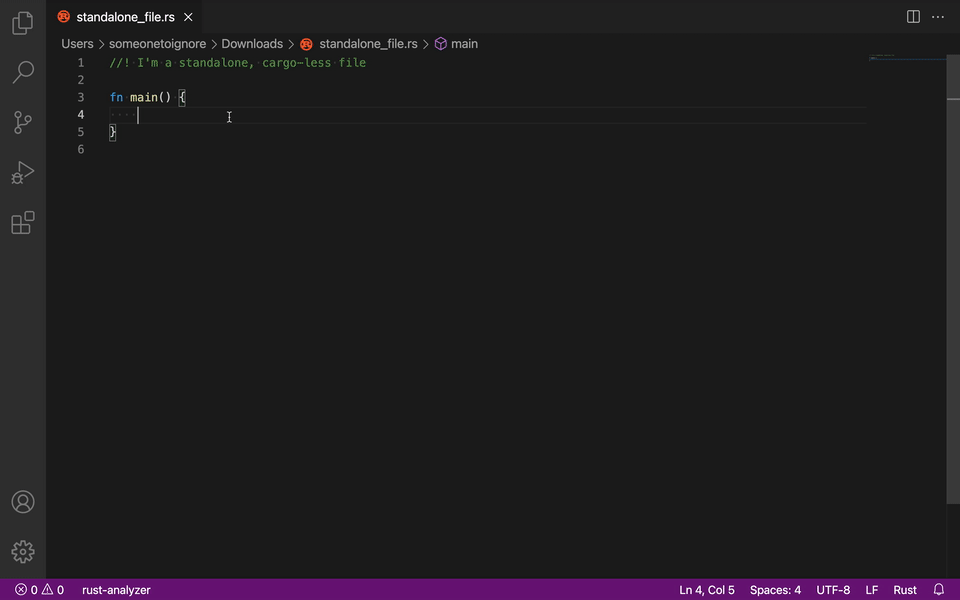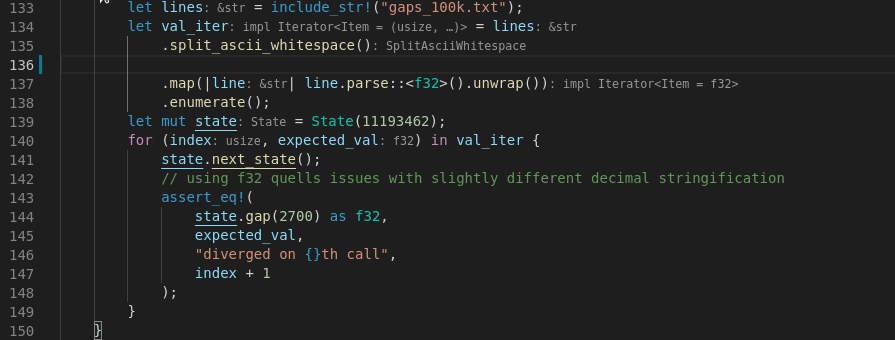8767: implement range formatting r=matklad a=euclio
Fixes#7580.
This PR implements the `textDocument/rangeFormatting` request using `rustfmt`'s `--file-lines` option.
Still needs some tests. What I want to know is how I should handle the instability of the `--file-lines` option. It's still unstable in rustfmt, so it's only available on nightly, and needs a special flag to enable. Is there a way for `rust-analyzer` to detect if it's using nightly rustfmt, or for users to opt-in?
Co-authored-by: Andy Russell <arussell123@gmail.com>
8955: feature: Support standalone Rust files r=matklad a=SomeoneToIgnore

Closes https://github.com/rust-analyzer/rust-analyzer/issues/6388
Caveats:
* I've decided to support multiple detached files in the code (anticipating the scratch files), but I found no way to open multiple files in VSCode at once: running `code *.rs` makes the plugin to register in the `vscode.workspace.textDocuments` only the first file, while code actually displays all files later.
Apparently what happens is the same as when you have VSCode open at some workplace already and then run `code some_other_file.rs`: it gets opened in the same workspace of the same VSCode with no server to support it.
If there's a way to override it, I'd appreciate the pointer.
* No way to toggle inlay hints, since the setting is updated for the workspace (which does not exist for a single file opened)
> [2021-05-24 00:22:49.100] [exthost] [error] Error: Unable to write to Workspace Settings because no workspace is opened. Please open a workspace first and try again.
* No runners/lens to run or check the code are implemented for this mode.
In theory, we can detect `rustc`, run it on a file and run the resulting binary, but not sure if worth doing it at this stage.
Otherwise imports, hints, completion and other features work.
Co-authored-by: Kirill Bulatov <mail4score@gmail.com>
8873: Implement import-granularity guessing r=matklad a=Veykril
This renames our `MergeBehavior` to `ImportGranularity` as rustfmt has it as the purpose of them are basically the same. `ImportGranularity::Preserve` currently has no specific purpose for us as we don't have an organize imports assist yet, so it currently acts the same as `ImportGranularity::Item`.
We now try to guess the import style on a per file basis and fall back to the user granularity setting if the file has no specific style yet or where it is ambiguous. This can be turned off by setting `import.enforceGranularity` to `true`.
Closes https://github.com/rust-analyzer/rust-analyzer/issues/8870
Co-authored-by: Lukas Tobias Wirth <lukastw97@gmail.com>
The new extension allows filtering of workspace symbool lookup
results by search scope or search kind.
Filtering can be configured in 3 different ways:
- The '#' or '*' markers can be added inline with the symbol lookup
query.
The '#' marker means symbols should be looked up in the current
workspace and any dependencies. If not specified, only current
workspace is considered.
The '*' marker means all kinds of symbols should be looked up
(types, functions, etc). If not specified, only type symbols are
returned.
- Each LSP request can take an optional search_scope or search_kind
argument query parameter.
- Finally there are 2 global config options that can be set for all
requests served by the active RA instance.
Add support for setting the global config options to the VSCode
extension.
The extension does not use the per-request way, but it's useful for
other IDEs.
The latest version of VSCode filters out the inline markers, so
currently the only reasonable way to use the new functionality is
via the global config.
8795: Allow semantic tokens for strings to be disabled r=matklad a=djrenren
Fixes https://github.com/rust-analyzer/rust-analyzer/issues/7111
Pretty straightforward change, but open to any suggestions if there's a more recommended testing strategy than what I went with.
Co-authored-by: John Renner <john@jrenner.net>
8624: Automatically detect rust library source file map r=vsrs a=vsrs
This PR adds a new possible `rust-analyzer.debug.sourceFileMap` value:
```json
{
"rust-analyzer.debug.sourceFileMap": "auto"
}
```
I did not make it the default because it uses two shell calls (`rustc --print sysroot` and `rustc -V -v`). First one can be slow (https://github.com/rust-lang/rustup/issues/783)
Fixes#8619
Co-authored-by: vsrs <vit@conrlab.com>
8629: Allow pressing | to surround closure arguments in VSCode r=matklad a=Smittyvb
This makes pressing <kbd>|</kbd> while some text is selected surround that text with pipes. This is useful when writing closures.
In this demo, I press <kbd>|</kbd> to easily surround some text (`predicate`) with pipe characters to create a closure. Before, this would have replaced `predicate` with just `|`.

(I am getting failures when I do `cargo test` even on `master` locally (due to #8585 I think), but GH Actions is fine with this)
8657: npm update r=matklad a=kjeremy
Co-authored-by: Smittyvb <me@smitop.com>
Co-authored-by: Jeremy Kolb <kjeremy@gmail.com>
7891: Improve handling of rustc_private r=matklad a=DJMcNab
This PR changes how `rust-analyzer` handles `rustc_private`. In particular, packages now must opt-in to using `rustc_private` in `Cargo.toml`, by adding:
```toml
[package.metadata.rust-analyzer]
rustc_private=true
```
This means that depending on crates which also use `rustc_private` will be significantly improved, since their dependencies on the `rustc_private` crates will be resolved properly.
A similar approach could be used in #6714 to allow annotating that your package uses the `test` crate, although I have not yet handled that in this PR.
Additionally, we now only index the crates which are transitive dependencies of `rustc_driver` in the `rustcSource` directory. This should not cause any change in behaviour when using `rustcSource: "discover"`, as the source used then will only be a partial clone. However, if `rustcSource` pointing at a local checkout of rustc, this should significantly improve the memory usage and lower indexing time. This is because we avoids indexing all crates in `src/tools/`, which includes `rust-analyzer` itself.
Furthermore, we also prefer named dependencies over dependencies from `rustcSource`. This ensures that feature resolution for crates which are depended on by both `rustc` and your crate uses the correct set for analysing your crate.
See also [introductory zulip stream](https://rust-lang.zulipchat.com/#narrow/stream/185405-t-compiler.2Fwg-rls-2.2E0/topic/Fixed.20crate.20graphs.20and.20optional.20builtin.20crates/near/229086673)
I have tested this in [priroda](https://github.com/oli-obk/priroda/), and it provides a significant improvement to the development experience (once I give `miri` the required data in `Cargo.toml`)
Todo:
- [ ] Documentation
This is ready to review, and I will add documentation if this would be accepted (or if I get time to do so anyway)
Co-authored-by: Daniel McNab <36049421+DJMcNab@users.noreply.github.com>
7901: Make extension respect http proxy settings r=matklad a=kamyuentse
This patch makes vscode extension respect proxy settings when fetching release metadata and rust-analyzer binary.
Co-authored-by: Kam Y. Tse <kevin.xjy@gmail.com>
A lot of these are duplicated from the documentation or main README. While it's unfortunate to have duplicated information, the current VSCode page is very barebones and doesn't offer much confidence.
This updated README offers a few more links and follows a structure similar to the official rust extension and other popular vscode extensions. The additions are, as much as possible specific to the vscode extension and not rust-analyzer as a LSP.
The note about not using the official extension is also right there at the top because that's a common issue people have when trying it out.
I added the sponsor section since it's common in other extensions README, but I'm not sure if it's necessary
7643: Automatically detect the rustc-src directory (fixes#3517) r=matklad a=bnjbvr
If the configured rustcSource was not set, then try to automatically
detect a source for the sysroot rustc directory.
I wasn't sure how to do it in the case of the project.json file, though.
7663: Tolerate spaces in nix binary patching r=matklad a=CertainLach
If path to original file contains space (I.e on code insiders, where
default data directory is ~/Code - Insiders/), then there is syntax
error evaluating src arg.
Instead pass path as str, and coerce to path back in nix expression
Co-authored-by: Benjamin Bouvier <public@benj.me>
Co-authored-by: Yaroslav Bolyukin <iam@lach.pw>
If path to original file contains space (I.e on code insiders, where
default data directory is ~/Code - Insiders/), then there is syntax
error evaluating src arg.
Instead pass path as str, and coerce to path back in nix expression
Signed-off-by: Yaroslav Bolyukin <iam@lach.pw>
Rather than eagerly converting JSON, we losslessly keep it as is, and
change the shape of user-submitted data at the last moment.
This also allows us to remove a bunch of wrong Defaults
7068: Add VSCode command to view the hir of a function body r=theotherphil a=theotherphil
Will fix https://github.com/rust-analyzer/rust-analyzer/issues/7061. Very rough initial version just to work out where I needed to wire everything up.
@matklad would you be happy merging a hir visualiser of some kind? If so, do you have any thoughts on what you'd like it show, and how?
I've spent very little time on this thus far, so I'm fine with throwing away the contents of this PR, but I want to avoid taking the time to make this more polished/interactive/useful only to discover that no-one else has any interest in this functionality.

Co-authored-by: Phil Ellison <phil.j.ellison@gmail.com>
7001: Add support for downloading aarch64-apple-darwin binaries r=matklad a=lnicola
There's also a slight behavior change here: we no longer download our 64-binaries on 32-bit Darwin and Linux. We still do that on Windows, as I don't know how to detect 32-bit Node on 64 Windows.
But some people install the 32-bit Code by mistake, I doubt 32-bit Windows is that popular in the Rust crowd.
Co-authored-by: Laurențiu Nicola <lnicola@dend.ro>
7002: Extension conflict check detects more combinations r=extremegf a=extremegf
This will also detect conflicts with kalitaalexey.vscode-rust and work correctly after RA is integrated with rust-lang.rust extension.
Co-authored-by: Przemyslaw Horban <p.horban@invinets.com>
Co-authored-by: P. Horban <extremegf@gmail.com>
6993: Clean up descriptions for settings r=matklad a=rherrmann
Use two consecutive newlines (`\n\n`) to actually continue text on a
new line.
Use proper markup to reference related settings.
Consistently format references to files, command line arguments, etc.
as `code`. Format mentions of UI elements in _italic_.
Fix typos, add missing full-stops, add missing default values.
Co-authored-by: Rüdiger Herrmann <ruediger.herrmann@gmx.de>
Use two consecutive newlines (`\n\n`) to actually continue text on a
new line.
Use proper markup to reference related settings.
Consistently format references to files, editor commands, command line
arguments, files, etc. as `code`.
Fix typos, add missing full-stops, add missing default values.
6984: Remove TextMate grammar r=dustypomerleau a=lnicola
Closes#6267
This is now included upstream in VS Code.
Co-authored-by: Laurențiu Nicola <lnicola@dend.ro>
The motivation in #5641 isn't too strong, but /etc/os-release exists on
pretty much every Linux distro, while /etc/nixos sounds like an
implementation detail.
Configuration is editor-independent. For this reason, we pick
JSON-schema as the repr of the source of truth. We do specify it using
rust-macros and some quick&dirty hackery though.
The idea for syncing truth with package.json is to just do that
manually, but there's a test to check that they are actually synced.
There's CLI to print config's json schema:
$ rust-analyzer --print-config-schema
We go with a CLI rather than LSP request/response to make it easier to
incorporate the thing into extension's static config. This is roughtly
how we put the thing in package.json.